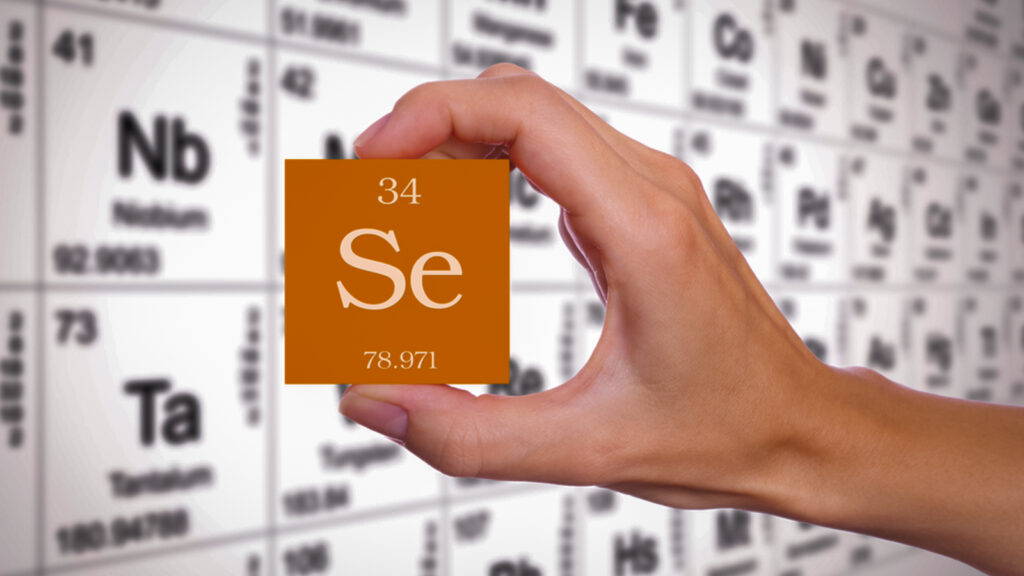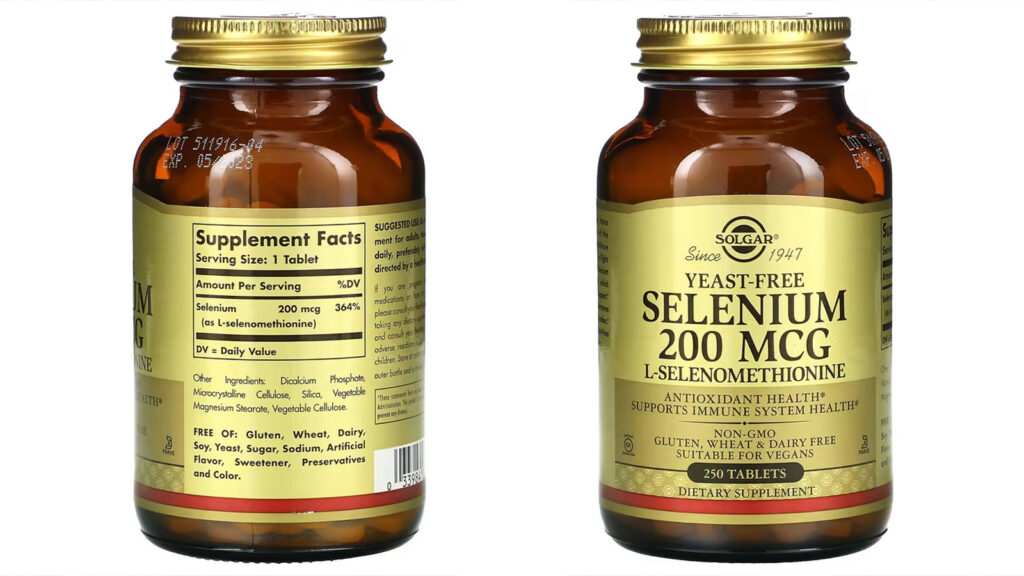Selenium is a trace element indispensable to the human body. Although required in small amounts, its impact on health and longevity cannot be overstated. This essential nutrient plays a pivotal role in numerous biological functions, including antioxidant defense, thyroid hormone regulation, and immune support. Despite its importance, selenium often goes unnoticed in discussions about nutrition. Understanding how selenium works, where to find it, and its potential benefits can help you optimize your health and well-being. This article delves into the properties of selenium, its health benefits, dietary sources, and the risks associated with deficiency or overconsumption.
“Selenium is one of the most powerful antioxidants in the body and plays an essential role in several key physiological processes that contribute to health and longevity,” says Dr. Thomas A. Brown, an expert in nutritional medicine.

What Is Selenium?
Selenium is a chemical element represented by the symbol “Se” and atomic number 34. In the human body, it primarily exists as selenoproteins, proteins bound to enzymes essential for various biological processes. These enzymes help protect against oxidative stress, regulate thyroid functions, and repair DNA.
“Selenium is a crucial component of selenoproteins that facilitate antioxidant activity and support numerous cellular processes vital to overall health,” states Dr. Emily S. Rhoades, a biochemist specializing in trace elements.
The Health Benefits of Selenium
Selenium offers a wide array of health benefits that are critical to maintaining optimal bodily functions. One of its most notable roles is as a powerful antioxidant. By being an integral part of the enzyme glutathione peroxidase, selenium helps neutralize free radicals that damage cells and tissues, thus reducing inflammation and oxidative stress. It is equally indispensable for thyroid health, as the thyroid gland boasts one of the highest concentrations of selenium in the body. This mineral aids in producing thyroid hormones that govern metabolism, energy levels, body weight, and even mental well-being.
Furthermore, selenium is a key player in immune system enhancement. By bolstering antioxidant defenses, it helps fight off viral infections and may even lower the risk of developing certain autoimmune disorders. Its role in cancer prevention is particularly intriguing; numerous studies suggest that selenium’s antioxidant and anti-inflammatory properties may reduce the risk of cancers such as prostate, lung, and colon. The benefits of selenium extend to cardiovascular health as well, as it mitigates inflammation and supports blood vessel function, reducing the likelihood of heart disease. Lastly, selenium is crucial for reproductive health. It enhances sperm quality and motility in men, while contributing to hormonal balance and fertility in women.
“Research consistently shows that selenium’s antioxidant and anti-inflammatory effects play a significant role in preventing chronic diseases such as cancer, cardiovascular disease, and autoimmune disorders,” affirms Dr. Alex T. Warner, a leading expert on cellular nutrition.

Dietary Sources of Selenium
Incorporating selenium-rich foods into your diet is essential to ensure adequate intake. Brazil nuts stand out as the richest source, with a single nut often containing more selenium than the recommended daily allowance. Fish and seafood, such as tuna, salmon, sardines, and shrimp, are also excellent sources. For meat lovers, chicken, turkey, pork, and beef provide substantial amounts of this mineral. Eggs and dairy products offer a moderate dose, making them suitable options for a balanced diet. Additionally, whole grains and legumes like brown rice, barley, lentils, and beans are good plant-based sources, though their selenium content can vary depending on soil quality. Including a mix of these foods in your daily meals can help maintain optimal selenium levels and support overall health.
“Incorporating a variety of selenium-rich foods is one of the most effective ways to ensure adequate intake and optimize overall health,” suggests Dr. Jennifer L. Mason, a nutritionist specializing in micronutrient deficiencies.
Selenium Deficiency
A deficiency in selenium can have profound effects on the body, leading to a variety of health complications. One of the most noticeable outcomes is an increased susceptibility to infections, as selenium plays a crucial role in maintaining a healthy immune system. Without adequate selenium, the body’s ability to defend against pathogens is weakened, making it more difficult to fight off illnesses. Another significant issue is muscle weakness and chronic fatigue, which can severely impact daily functioning and quality of life. Selenium also plays a vital role in thyroid health, and a deficiency may impair thyroid function, potentially leading to conditions like hypothyroidism. One of the most severe consequences of selenium deficiency is the development of Keshan disease, a rare but serious heart condition that has been directly linked to extremely low selenium levels.
“Selenium deficiency can manifest in numerous ways, and individuals who are deficient are more prone to infections, thyroid disorders, and cardiovascular diseases,” warns Dr. Rachel K. Lee, a specialist in clinical nutrition. This highlights the importance of maintaining adequate selenium intake to prevent these potentially debilitating health issues.
Risks of Overconsumption
While selenium is an essential nutrient, it is important to remember that too much of it can be harmful. Excessive selenium intake, known as selenosis, can result in a range of side effects that can negatively impact health. One of the most recognizable symptoms of overconsumption is a garlic-like odor on the breath, which occurs as the body excretes excess selenium. Other common side effects include nausea, vomiting, and diarrhea, which can cause dehydration and discomfort. Over time, prolonged high intake may also lead to hair loss and brittle nails, as well as neurological symptoms such as tremors, which can impair motor function.
The tolerable upper intake level for selenium is set at approximately 400 µg per day for adults, beyond which the risk of toxicity increases. “While selenium is essential for health, excessive intake can lead to toxicity, so it’s important to follow recommended dosage guidelines,” advises Dr. Carl H. Dunn, a toxicologist and nutrition expert. It is therefore crucial to strike a balance and ensure that selenium intake remains within safe and beneficial levels to avoid these adverse effects.

Incorporating Selenium into Your Routine
For optimal selenium intake, explore a wide range of quality supplements on iHerb. This platform offers certified products tailored to your nutritional needs. Click here to discover carefully selected selenium supplements. Adding these supplements to your daily routine can help maintain optimal nutritional balance and improve overall well-being.
Conclusion
Selenium is an essential nutrient for the body’s proper functioning. By supporting thyroid health, strengthening the immune system, and protecting against oxidative stress, it plays a crucial role in preventing many diseases. However, it’s important to adhere to recommended intake levels to avoid the risks of overconsumption.
For optimal balance, include selenium-rich foods in your diet and consult a healthcare professional if considering supplements.
reference
World Health Organization (WHO) – Information on trace elements and their importance in nutrition.
National Institutes of Health (NIH) – Selenium factsheet for health professionals.
Harvard T.H. Chan School of Public Health – Details about selenium’s role in diet and health.
PubMed – Research studies on selenium’s role in preventing diseases like cancer and heart disease.
- Example study: Selenium in Cancer Prevention
Mayo Clinic – Overview of selenium’s benefits and risks.
iHerb Product Information – Specific supplements and customer reviews to enhance the commercial section.
Linus Pauling Institute at Oregon State University – Comprehensive information on selenium and its functions.

























Leave a Reply